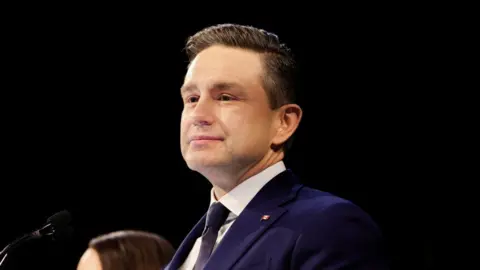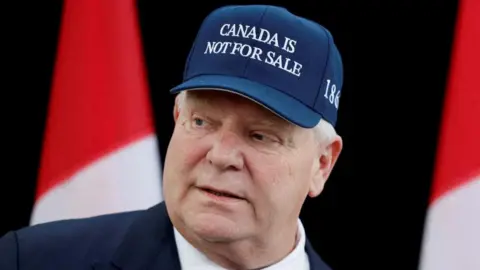How Canada's Conservatives threw away a 27-point lead to lose again
 Reuters
ReutersConservatives in Canada are trading blame for Monday night's election loss, showing that Pierre Poilievre will need to heal divisions within the movement as he fights to stay on as leader.
As a clear Liberal win was emerging on election night, Conservative candidates and their supporters had one question: What the heck just happened?
The party had lost a remarkable 27-point lead in opinion polls and failed to win an election for the fourth time in a row.
And while it gained seats and earned almost 42% of the popular vote - its highest share since the party was founded in 2003 - its leader Poilievre was voted out of the seat he had held for the past 20 years.
"Nobody's happy about that," Shakir Chambers, a Conservative strategist and vice-president of Ontario-based consultancy firm the Oyster Group, told the BBC.
The party is now trying to work out how it will move forward.
At the top of the agenda will be finding a way for the Conservatives to perform their duties as the Official Opposition - the second-place party in Canada's parliament whose job is to hold the sitting government to account - without their leader in the House.
Ahead of a caucus meeting next Tuesday to discuss this, Poilievre announced on Friday his plan to run in an Alberta constituency special election to win back a seat.
That special election will be triggered by the resignation of Conservative MP-elect Damien Kurek, who said he will voluntarily step down to let Poilievre back in after what he called "a remarkable national campaign".
"An unstoppable movement has grown under his leadership, and I know we need Pierre fighting in the House of Commons," Kurek said in a statement.
Unlike the US, federal politicians in Canada do not have to live in the city or province they run in. Poilievre grew up in Alberta, however, and will likely win handily as the constituency he is running in is a Conservative stronghold.
A big question is whether Poilievre still has the backing of his own party to stay on as leader. Mr Chambers said the answer, so far, is a resounding yes.
"Pierre has a lot of support in the caucus," he said. "I don't think there's anybody that wants him removed, or that has super high ambitions that wants to replace him as leader."
A number of high-profile Conservatives have already rallied behind him. One of them is Andrew Scheer, a current MP and former leader of the party, who said Poilievre should stay on to "ensure we finish the job next time".
Others are casting blame on where they went wrong.
Jamil Jivani, who won his own constituency in a suburb of Toronto handily, felt that Ontario leader Doug Ford had betrayed the conservative movement and cost the party the election.
The federal and provincial Conservative parties are legally different entities, though they belong to the same ideological tent, and Ford is leader of Ontario's Progressive Conservative Party.
He frequently made headlines during the election campaign for his get-tough attitude with Donald Trump and the US president's trade war.
"He couldn't stay out of our business," Jivani told a CBC reporter.
Jivani, who in a past life attended Yale University with US Vice-President JD Vance, where the two became good friends, accused Ford of distracting from the federal Conservatives' campaign and of "positioning himself as some political genius that we need to be taking cues from".
But Mr Chambers, the Conservative strategist, said that Poilievre will also need to confront where the party fell short.
 Reuters
ReutersPoilievre, who is known for his combative political style, has struggled with being unlikeable among the general Canadian public.
He has also failed to shore up the support of popular Conservative leaders in some provinces, like Ontario's Ford, who did not campaign for Poilievre despite his recent landslide victory in a provincial election earlier this year. Ford did, however, post a photo of him and Liberal leader Mark Carney having a coffee.
"Last time I checked, Pierre Poilievre never came out in our election," Ford told reporters earlier this week. "Matter of fact, he or one of his lieutenants told every one of his members, 'don't you dare go out and help'".
"Isn't that ironic?"
Another Conservative premier, Tim Houston of Nova Scotia - who also did not campaign for Poilievre - said the federal party needs to do some "soul-searching" after its loss.
"I think the Conservative Party of Canada was very good at pushing people away, not so good at pulling people in," Houston said.
Not every premier stood on the sidelines. Poilievre was endorsed by Alberta's Danielle Smith and Saskatchewan's Scott Moe, both western Conservatives.
Kory Teneycke, Ford's campaign manager, who publicly criticised Poilievre's campaign during the election, angering federal Conservatives, rejected the notion that Ford's failure to endorse Poilievre had cost him the election.
He told the BBC that, to him, the bigger problem was Poilievre's failure to unite Conservative voters in Canada.
"What constitutes a Conservative in different parts of the country can look quite different," he said, adding that Poilievre's populist rhetoric and aggressive style appealed to Conservatives in the west, but alienated those in the east.
"There was a lot of Trump mimicry in terms of how they presented the campaign," Mr Teneycke said.
"Donald Trump is public enemy number one to most in Canada, and I don't think it was coming across very well."
He added he believes some of the "soul-searching" by Poilievre's Conservatives will need to include a plan of how to build a coalition of the right in a country "as big and diverse as Canada".
Asked by reporters what it would take to heal the rift, Ford answered: "All they have to do is make a phone call."
